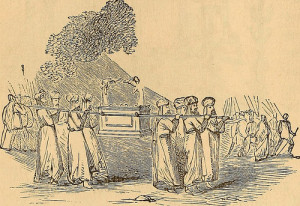Recently, I thought it’d be good to revisit some of the foundational elements of Marriage 101, so I scoured my bookshelves and picked up Gary Smalley’s Secrets to Lasting Love, a book my wife and I bought over a decade ago but never actually read.
I found myself squirming a bit as I read about the tendency for spouses to get laser focused on proving they’re right and the other person is wrong during times of conflict. The author talks about the crucial need to validate where the other person is coming from, regardless of whether or not you agree with the person’s opinion, point of view, or understanding of truth in a given situation.
As I was reflecting, I realized that when I’m bent on proving to my wife that I’m right – which I’m not proud to say has happened countless times over the years – it’s generally because I’m coming from a place of fear. Fear that my needs won’t be met or that things won’t work out well or that my heart will somehow be trampled on.
I usually present a very logical case without a lot of overt emotion, so in the moment I may not realize or acknowledge that it’s a fear-based, self-preservation mode that’s driving my course of action. One that ultimately doesn’t trust that things will be just fine. And one that tramples intimacy.

I find it ironic that I’ve been reading this book and doing this self-reflection in tandem with the Supreme Court’s ruling on gay marriage. The intensity of the responses coming from many within the conservative, evangelical Christian groups reminds me of how I can sometimes respond to conflict in my marriage.
I buckle down. I won’t give in. I don’t want to give any weight to my wife’s point of view. I’m set on making my point crystal clear and showing her why I’m right and, by implication, why she’s wrong.
In the last several days, I’ve read the heated responses of countless people insisting that Adam and Eve show us that God’s plan for marriage from the beginning of all time has been “one man, one woman.” And, therefore, the Supreme Court’s ruling is a clear affront to God.
Now that can definitely seem valid and rational. But just as my wife often has an alternate view to my logical, well-thought-out one, there are other viewpoints within the greater Christian community. And it might be good to actually consider them.
For example, one reason I disagree with using scripture to prop up the “one man, one woman” notion is because it means avoiding a host of laws in the Old Testament that govern polygamy. Yes, we can engage in the fancy footwork to dance around those passages and come up with eloquently presented explanations as to why the laws don’t really mean that God was okay with polygamy.
But even if we do that, we’re still left to explain away the story of David and Bathsheba, where scripture tells us that God took a group of wives from David’s master and gave them to David, presumably as a blessing to David for being God’s anointed. And when David botches up, God says “I will take your wives and give them to one who is close to you, and he will sleep with your wives in broad daylight.”

In my opinion, the portrayal in scripture of God shuffling wives from one man to another – more than once – simply doesn’t leave room for a timeless expectation of “one man, one woman” established by God at the dawn of creation (unless we’re willing to acknowledge that God is clearly content to indulge wayward behavior). What it does leave room for is placing the scriptures in the context and culture that they were written in – a context and a culture where polygamy was normal and acceptable.
To be sure, everyone has the right to their own opinion on the topic of gay marriage. But it’s problematic when we insist that God has the same opinion. We never think of it in those terms, of course. We’re coming at it having been told or taught that “God believes X” and we have scripture in mind that seemingly supports it, so we think we’re merely standing on the side of truth.
It’s rather like when I’m in a conflict with my wife and the fearful need to cling to my truth keeps me from attempting to bridge the distance between us.
Now I’m sure there are plenty of people eager to rip me a new one by pointing to Romans 1 or 1 Corinthians 6 to show me why I’m clearly wrong and they’re clearly right. They’ve got their figurative boxing gloves on and they’re ready to duke it out – no matter how many black eyes, split lips, or near concussions are involved. Just like my tendency can be with my wife in times of conflict.
But again – there’s another side.
It may seem absolutely inconceivable that other viewpoints could possibly have merit when things seem so “clear,” but there are reasons that massive numbers of people within Christian communities are shifting their stance on the LGBT issue. And trust me, they’re not doing it to be part of the “in crowd” or merely to cave to society’s whims, contrary to the accusations of many other Christians.
They’re doing it thoughtfully, responsibly, faithfully. And, in many cases, after much struggle. But they had to remove their boxing gloves and be willing to listen to and consider another viewpoint. And to consider one very uncomfortable and potentially scary possibility: that maybe “being right” isn’t the goal.
I realize this a complex, heated topic and it raises tons of “Well then what about X, Y, or Z?” questions for many Christians. But I don’t think digging our heels in is the answer.
In the book I’ve been reading, Gary Smalley implores readers to trust that intimacy will be achieved when two spouses validate each other’s opinions and feelings in spite of being in disagreement. It reminds me of something I heard a minister say many years ago: we can’t let our desire to be right get in our way of being close. Yet we do it all the time: individually and corporately. And there are casualties because of it.
Scripture tells us that there is no fear in love and that perfect love casts out fear. Scripture tells us that love is greater than faith and hope.

Scripture tells us that Jesus said the two most important things are to love God and love your neighbor as yourself and that all the Law and the prophets hang on those two things. All the Law. All the prophets. All. Fulfilled with love.
Now, with that in mind, consider this:
God didn’t need people to use scripture centuries ago to “prove” the earth was the center of a three-tiered universe to silence the uncomfortable claims and evidence to the contrary. But people did.
God didn’t need people to use scripture in recent history to “prove” that slavery was acceptable and that black people were second-class humans in the face of movements to the contrary. But people did.
And God doesn’t need people to use scripture now to “prove” that the Supreme Court’s ruling is an affront to God because “one man, one woman” is God’s timeless expectation. Or to “prove” that those who don’t oppose gay marriage are subject to God’s judgment on the matter.
Just as I hope to get better at putting away the boxing gloves in my marriage, my hope is that Christian communities can put down their boxing gloves and humbly consider our history, move away from places of fear, and let go of the insistence on being right.
In doing so, maybe we’ll start to realize that the scandal and danger of the gospel is that love really does win.





